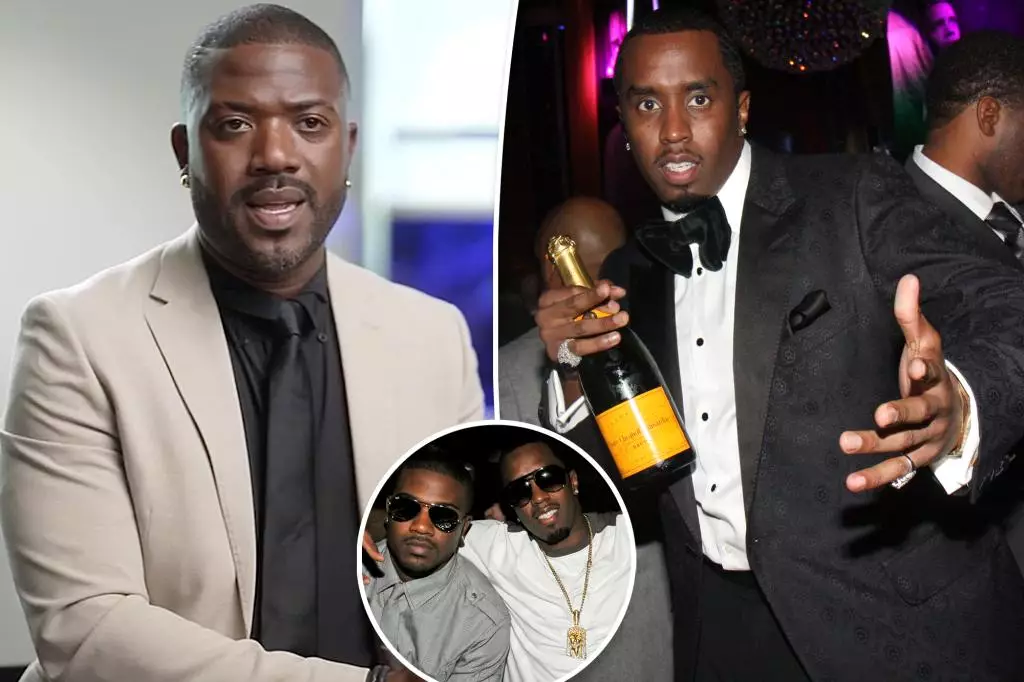In a revealing recent interview, singer Ray J shed light on a disturbing subculture of silence and complicity that seems to permeate the upper echelons of celebrity. This discussion came during his dialogue with TMZ’s Harvey Levin for the documentary titled “The Downfall of Diddy: Inside the Freak-Offs.” Ray J’s remarks come at a time when Sean “Diddy” Combs is facing serious allegations, including sex trafficking and racketeering. The singer alleged that many within the industry are leveraging their victim stories to shield themselves from the legal ramifications surrounding Diddy’s controversies, a claim that raises pressing questions about accountability in Hollywood.
Ray J asserted that there exists a mechanism within the entertainment industry that encourages silence among those who have harrowing stories or experiences. He observed that individuals often receive monetary compensation in exchange for their silence regarding sensitive matters tied to influential figures like Diddy. “They’ll say, ‘I’ll give you money. Please don’t talk,’” Ray J explained, underscoring the pressure that can fester in a world where image often supersedes honesty.
This assertion touches on a broader issue—the economics of silence wherein victims feel compelled to prioritize financial security over public truth. These individuals, who are often powerful in their own right, may feel that the temporary security provided by such agreements outweighs the long-term implications of unresolved trauma.
This specter of silence stems not only from a desire to protect one’s reputation, but it also represents a more profound psychological impact. Victims of abuse or exploitation often grapple with feelings of shame, isolation, and fear, which can be compounded when they notice others seemingly thriving despite their wrongdoings. Ray J’s comments reveal a troubling dichotomy where some choose to commodify their stories, trading them for silence and financial gain.
Ray J further disclosed that he is approached by many high-profile individuals seeking an outlet for their experiences, yet they remain hesitant to come forward fully. The very notion that they trust Ray J with their stories illustrates the precarious balance between celebrity culture and personal truth, where speaking out could lead to backlash or ostracism rather than justice.
As the legal battles surrounding Diddy escalate, the implications extend beyond just personal problems for the mogul. Spurred by a series of sexual assault claims, many now await the results of the investigations and their potential fallout. Notably, Texas-based attorney Tony Buzbee, who represents multiple alleged victims, hinted that the implications of Diddy’s alleged actions might reveal a network of enablers, individuals who facilitated or overlooked these incidents for financial or social gain. Such revelations could challenge the very fabric of celebrity culture, demanding a reevaluation of who is held accountable.
Additionally, the latest reports of altercations between Ray J and Diddy’s sons depict a troubling signal that personal relationships within this realm are strained under the weight of public scrutiny. Such incidents highlight the often-overlooked human side of these scandals. The pain and discord that results from these legal struggles inevitably ripple throughout networks of friends and family, leading to further complications in interpersonal relationships.
Ray J’s disclosures prompt a critical reflection on the culture surrounding celebrity and power. The normalization of silence, whether through financial incentives or fear of backlash, suggests that deeper reform is necessary—not just in legal settings but also within the industry’s culture. It raises essential questions: What does it mean to prioritize reputation over justice? How can survivors reclaim their narratives without fear of losing their livelihoods?
The impact of sexuality and exploitation in the entertainment industry cannot be understated. As the public awaits further developments in Diddy’s legal challenges, it becomes increasingly vital to ensure that conversations about consent, accountability, and truth continue to unfold. Only through this can the cycle of silence be broken, paving the way for transparency and healing in a highly scrutinized arena.
As the dust settles on this explosive conversation, Ray J’s bold statements may serve as a catalyst for deeper discussions around the need for accountability in celebrity culture. The challenge remains: how will the industry respond to these claims, and will anyone be brave enough to turn whispers of exploitation into shouts for justice? The answers to these questions may shape the future of Hollywood and its approach toward ethics, truth, and accountability.

